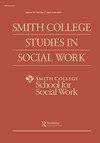非殖民化的学校社会工作实践:围绕权力、特权和压迫的微妙舞蹈
IF 0.9
Q2 SOCIAL WORK
引用次数: 0
摘要
摘要学校社会工作是临床社会工作实践的一个专业领域。就像社会工作的任何方面一样,它可以:在最好的情况下,用来支持和提升学生、家庭和社区;最糟糕的是,它以明显和隐性的方式压迫儿童、青少年和他们的照顾者。学校社会工作者需要培养批判意识,批判性地思考他们在这些机构中的地位,因为他们在塑造学校的社会正义和福祉方面具有发言权和作用。本文反映了非殖民化的概念及其在小学和中学背景下的意义,特别是与来自少数群体和文化的学生有关。我以自己作为一个在白人占主导地位的地方工作的种族化的人的经历为基础,研究了学校社会工作者可能被卷入有关学业成就、行为和发展的主导思想的方式。以舞蹈为隐喻,强调学校关系是破坏旨在维持现状的系统结构的一种手段。关键词:去殖民化学校社会工作种族主义临床社会工作实践社会公正披露声明作者未报告潜在的利益冲突。注1:我在这里使用“种族化”一词是为了反映这样一种观念,即有色人种最常受到社会过程的影响,而且往往受到与按种族分类有关的负面假设的影响(Process of racialization, citation .d.)Nakash博士是史密斯学院社会工作学院博士课程的主任,也是本期特刊的共同编辑之一。本文章由计算机程序翻译,如有差异,请以英文原文为准。
Decolonizing School Social Work Practice: The Delicate Dance Around Power, Privilege and Oppression
ABSTRACTSchool social work is a specialized area of clinical social work practice. Like any aspect of social work, it can be: at its best, used to support and uplift students, families and communities; and at its worst, used to oppress children, youth and their caregivers in both obvious and tacit ways. School social workers need to develop critical consciousness and think critically about their positionality within these institutions, as they have a voice and role in shaping social justice and well-being in schools. This paper reflects upon the notion of decolonization and its meanings within elementary and secondary school contexts, particularly as it relates to students from minoritized groups and cultures. I examine the ways in which school social workers may be drawn into becoming complicit in dominant ideas about academic achievement, behaviors and development, based on my own experiences as a racialized person working in predominantly white spaces. Using the metaphor of a dance, school-based relationships are highlighted as a means to disrupt the systemic structures that are designed to maintain the status quo.KEYWORDS: Decolonizationschool social workracismclinical social work practicesocial justice Disclosure statementNo potential conflict of interest was reported by the author(s).Notes1 I use the term “racialized” here to reflect the notion that people of color are most usually subject to the social processes and often negative assumptions involved with being categorized by their race (Process of racialization, Citationn.d.).2 Dr. Nakash is the Director of the Smith College School for Social Work doctoral program, and is one of the co-editors of this special issue.
求助全文
通过发布文献求助,成功后即可免费获取论文全文。
去求助
来源期刊

SMITH COLLEGE STUDIES IN SOCIAL WORK
SOCIAL WORK-
CiteScore
1.50
自引率
10.00%
发文量
10
期刊介绍:
Smith College Studies in Social Work focuses on the vital issues facing practitioners today, featuring only those articles that advance theoretical understanding of psychological and social functioning, present clinically relevant research findings, and promote excellence in clinical practice. This refereed journal addresses issues of mental health, therapeutic process, trauma and recovery, psychopathology, racial and cultural diversity, culturally responsive clinical practice, intersubjectivity, the influence of postmodern theory on clinical practice, community based practice, and clinical services for specific populations of psychologically and socially vulnerable clients.
 求助内容:
求助内容: 应助结果提醒方式:
应助结果提醒方式:


